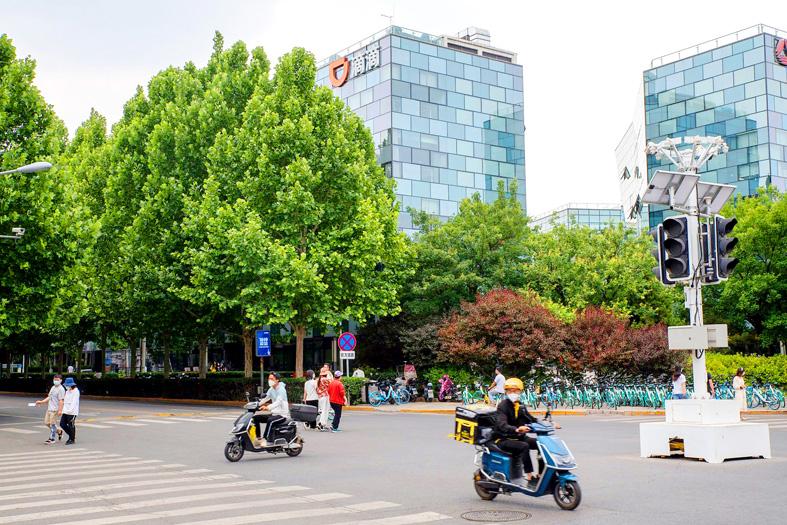China is preparing to fine ride-hailing giant Didi Global Inc (滴滴) more than US$1 billion to wrap up a long-running probe, media reports have said, boosting investors’ hopes that the country’s tech crackdown is winding down.
Didi, once known as China’s answer to Uber Technologies Inc, has been one of the highest-profile targets of the widespread clampdown on the sector, which saw years of runaway growth and supersized monopolies before regulators stepped in.
The fine — imposed over Didi’s cybersecurity practices — would amount to more than 4 percent of its US$27.3 billion revenue last year and pave the way for its new share listing in Hong Kong, the Wall Street Journal reported on Tuesday.

Photo:Bloomberg
Citing unnamed sources familiar with the matter, the newspaper said that once the fine is announced, the Chinese government would ease its restrictions on Didi’s operations.
The firm was prevented from adding new users, and regulators ordered its apps removed from online stores in China.
The Wall Street Journal report triggered a rally in Chinese tech shares in Hong Kong yesterday, with investors hopeful that the two-year regulatory storm that swept the sector was nearing its end.
E-commerce giant Alibaba Group Holding Ltd (阿里巴巴) soared 4 percent, while gaming titan Tencent Holdings Ltd (騰訊) gained 2.5 percent in early trade.
If confirmed, Didi’s fine would be the largest imposed on a Chinese tech company since Alibaba was told to pay US$2.75 billion in April last year over anticompetitive practices.
Didi did not respond immediately to an e-mailed request for comment.
China’s regulatory crackdown this year eased, as the country grapples with the economic fallout from its “zero COVID-19” strategy, with China struggling to reach its 5.5 percent growth target.
However, there is still a strict regulatory environment for tech firms.
Chinese President Xi Jinping (習近平) last month called for stronger oversight and better security in the financial tech arena.

Intel Corp chief executive officer Lip-Bu Tan (陳立武) is expected to meet with Taiwanese suppliers next month in conjunction with the opening of the Computex Taipei trade show, supply chain sources said on Monday. The visit, the first for Tan to Taiwan since assuming his new post last month, would be aimed at enhancing Intel’s ties with suppliers in Taiwan as he attempts to help turn around the struggling US chipmaker, the sources said. Tan is to hold a banquet to celebrate Intel’s 40-year presence in Taiwan before Computex opens on May 20 and invite dozens of Taiwanese suppliers to exchange views

Application-specific integrated circuit designer Faraday Technology Corp (智原) yesterday said that although revenue this quarter would decline 30 percent from last quarter, it retained its full-year forecast of revenue growth of 100 percent. The company attributed the quarterly drop to a slowdown in customers’ production of chips using Faraday’s advanced packaging technology. The company is still confident about its revenue growth this year, given its strong “design-win” — or the projects it won to help customers design their chips, Faraday president Steve Wang (王國雍) told an online earnings conference. “The design-win this year is better than we expected. We believe we will win

Quanta Computer Inc (廣達) chairman Barry Lam (林百里) is expected to share his views about the artificial intelligence (AI) industry’s prospects during his speech at the company’s 37th anniversary ceremony, as AI servers have become a new growth engine for the equipment manufacturing service provider. Lam’s speech is much anticipated, as Quanta has risen as one of the world’s major AI server suppliers. The company reported a 30 percent year-on-year growth in consolidated revenue to NT$1.41 trillion (US$43.35 billion) last year, thanks to fast-growing demand for servers, especially those with AI capabilities. The company told investors in November last year that

Power supply and electronic components maker Delta Electronics Inc (台達電) yesterday said it plans to ship its new 1 megawatt charging systems for electric trucks and buses in the first half of next year at the earliest. The new charging piles, which deliver up to 1 megawatt of charging power, are designed for heavy-duty electric vehicles, and support a maximum current of 1,500 amperes and output of 1,250 volts, Delta said in a news release. “If everything goes smoothly, we could begin shipping those new charging systems as early as in the first half of next year,” a company official said. The new